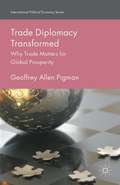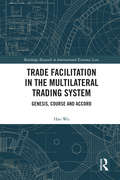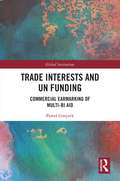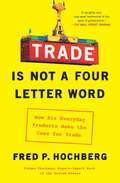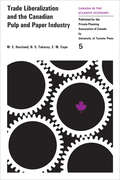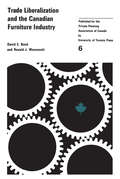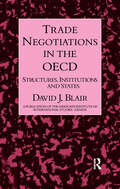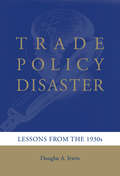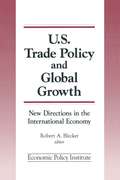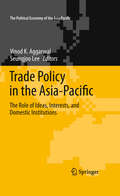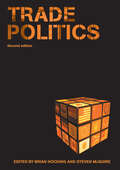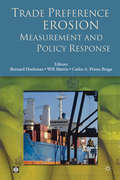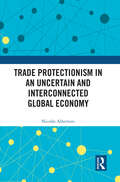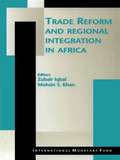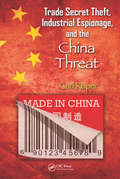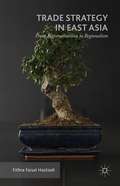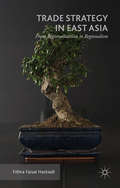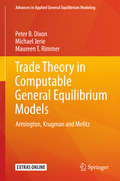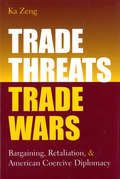- Table View
- List View
Trade Diplomacy Transformed: Why Trade Matters for Global Prosperity (International Political Economy Series)
by Geoffrey Allen PigmanThis is the first book to tell the story of the diplomacy that has made the international trading system what it is today. It reveals how three major transformations over the past two centuries have shaped the way goods, services, capital and labour cross borders, as buyers and sellers meet in the global marketplace.
Trade Elasticities in the Middle East and Central Asia: What is the Role of Oil?
by Dalia S. Hakura Andreas BillmeierA report from the International Monetary Fund.
Trade Facilitation in the Multilateral Trading System: Genesis, Course and Accord (Routledge Research in International Economic Law)
by Hao WuNegotiations on trade facilitation were concluded at the WTO 9th Ministerial Conference in 2013, and the Agreements on Trade Facilitation (TFA), therefore, became the first fully multilateral agreement in WTO history. Since then, trade facilitation has been in the limelight on the stage of the world trading system. During recent years, the TFA has been consistently on the agenda of the summits of G20, G7, and APEC. The Agreement has come into force and shall be implemented on a global scale. As a result, the WTO members shall be prepared to translate the Agreement into their domestic legislation, which will involve a series of reforms in trade laws and policies. There are extensive voices demanding a comprehensive expatiation on trade facilitation and the TFA. It is essential to systematically delve into the genesis of trade facilitation, revisit the course where the TFA came into being, and analyse the well-turned legalese of the TFA. This book meets this demand. This book is path-breaking in these aspects: it expounds on the rationales for trade facilitation and the significance of constituting an international accord on trade facilitation; it restores the one-century track of the international community’s talks on trade facilitation, from the times of the League of Nations to the WTO era; it reveals how the WTO negotiating mechanisms enabled the TFA to be nailed down, which would be enlightening for trade diplomats engaged in other WTO negotiations; and it provides an in-depth commentary on the TFA articles, which will help stakeholders more accurately understand and implement the Agreement. This book will be especially valuable for government officials and policy-makers, trade practitioners, lawyers, advisers, and scholars interested in international economic law, WTO law, international trade, international relations, and international development studies.
Trade Governance in the Digital Age
by Thomas Cottier Mira BurriThe development of new digital technologies has resulted in significant transformations in daily life, from the arrival of online shopping to more fundamental changes in the ways we work and communicate. Many of these changes raise questions that transcend market access and liberalisation, and demand cooperation and coherent regulatory design. International trade regulation has hitherto not reacted in a forward-looking manner to the digital revolution and, particularly at the multilateral level, legal engineering has yielded few tangible results. This book examines whether WTO laws possess the necessary flexibility and resilience to accommodate the changes brought about by burgeoning digital trade. By revealing both the potential and the limitations of the WTO framework, it provides a broad picture of the interaction between digital technologies and trade regulation, links the often disconnected discourses of international trade law, intellectual property and cyberlaw and explores discrete problems in different domains of global trade regulation.
Trade Interests and UN Funding: Commercial Earmarking of Multi-bi Aid (Global Institutions)
by Paweł GmyrekThis book examines a particular type of donor behavior – known as country earmarking of contributions – which occurs within the voluntary financing system of the United Nations. The research demonstrates that already during the period of the Millennium Development Goals a large share of the voluntary multilateral funding decisions was influenced by the commercial priorities of the OECD/DAC donor countries. The theoretical contribution focuses on disentangling the mix of policy advantages that can be pursued through linking of donors’ commercial priorities with multi-bilateral development programs. The book considers its empirical findings within the current framework of the Sustainable Development Goals and the associated aid financing architecture. It demonstrates that, despite many negative associations of commercial aid giving, it is difficult to make an indisputably negative judgment on the practice of commercial earmarking in the specific context of the specialized UN agencies. The author argues that whether commercial earmarking proves to be a curse or a blessing for the multilateral development institutions will very much depend on the availability of parallel, flexible funding, and the creation of adequate political and operational space for supranational norm-keepers. Synthesizing the existing knowledge concerning the supply-side of multi-bi aid, this book provides an accessible, entry-level overview of the topic that will appeal to students and scholars of global governance and international organizations.
Trade Is Not a Four-Letter Word: How Six Everyday Products Make the Case for Trade
by Fred P. Hochberg&“A sprightly and clear-eyed testimonial to the value of globalization&” (The Wall Street Journal) as seen through six surprising everyday goods—the taco salad, the Honda Odyssey, the banana, the iPhone, the college degree, and the blockbuster HBO series Game of Thrones.Trade allows us to sell what we produce at home and purchase what we don&’t. It lowers prices and gives us greater variety and innovation. Yet understanding our place in the global trade network is rarely simple. Trade has become an easy excuse for struggling economies, a scapegoat for our failures to adapt to a changing world, and—for many Americans on both the right and the left—nothing short of a four-letter word. But as Fred P. Hochberg reminds us, trade is easier to understand than we commonly think. In Trade Is Not a Four-Letter Word, you&’ll learn how NAFTA became a populist punching bag on both sides of the aisle. You&’ll learn how Americans can avoid the grim specter of the $10 banana. And you&’ll finally discover the truth about whether or not, as President Trump has famously tweeted, &“trade wars are good and easy to win.&” (Spoiler alert—they aren&’t.) Hochberg debunks common trade myths by pulling back the curtain on six everyday products, each with a surprising story to tell: the taco salad, the Honda Odyssey, the banana, the iPhone, the college degree, and the smash hit HBO series Game of Thrones. Behind these six examples are stories that help explain not only how trade has shaped our lives so far but also how we can use trade to build a better future for our own families, for America, and for the world. Trade Is Not a Four-Letter Word is the antidote to today&’s acronym-laden trade jargon pitched to voters with simple promises that rarely play out so one-dimensionally. Packed with colorful examples and highly digestible explanations, Trade Is Not a Four-Letter Word is &“an accessible, necessary book that will increase our understanding of trade and economic policies and the ways in which they impact our daily lives&” (Library Journal, starred review).
Trade Liberalization and the Canadian Pulp and Paper Industry
by William Haviland N. S. Takacsy Edward CapeThe economic impact of free trade among the North Atlantic countries on the Canadian pulp and paper industry is here discussed in a detailed analysis of costs and marketing.
Trade Liberalizaton and the Canadian Furniture Industry
by Ronald J. Wonnacott David E. BondPublished for the Private Planning Association of Canada as part of the Canada in the Atlantic Economy series, this book covers impact of trade liberalization on Canadian agriculture, prospects for trade liberalization in agriculture, as well as trade liberalization and the Canadian pulp and paper industry and trade liberalization and the Canadian furniture industry.
Trade Negotiations In The Oecd: Structures, Institutions And States
by BlairFirst published in 1993. Routledge is an imprint of Taylor & Francis, an informa company.
Trade Openness and Volatility
by Andrei A. Levchenko Julian Di GiovanniA report from the International Monetary Fund.
Trade Patterns Among Industrial Countries: Their Relationship to Technology Differences and Capital Mobility
by Mika SaitoA report from the International Monetary Fund.
Trade Policy Developments in Industrial Countries
by Shailendra J. AnjariaThis study reviews recent developments in international trade policies in selected industrial countries. It was prepared for the June 1981 World Economic Outlook.
Trade Policy Disaster: Lessons from the 1930s (Ohlin Lectures)
by Douglas A. IrwinThe extreme protectionism that contributed to a collapse of world trade in the 1930s is examined in light of the recent economic crisis.The recent economic crisis—with the plunge in the stock market, numerous bank failures and widespread financial distress, declining output and rising unemployment—has been reminiscent of the Great Depression. The Depression of the 1930s was marked by the spread of protectionist trade policies, which contributed to a collapse in world trade. Although policymakers today claim that they will resist the protectionist temptation, recessions are breeding grounds for economic nationalism, and countries may yet consider imposing higher trade barriers. In Trade Policy Disaster, Douglas Irwin examines what we know about trade policy during the traumatic decade of the 1930s and considers what we can learn from the policy missteps of the time.Irwin argues that the extreme protectionism of the 1930s emerged as a consequence of policymakers' reluctance to abandon the gold standard and allow their currencies to depreciate. By ruling out exchange rate changes as an adjustment mechanism, policymakers turned instead to higher tariffs and other means of restricting imports. He offers a clear and concise exposition of such topics as the effect of higher trade barriers on the implosion of world trade; the impact of the Smoot-Hawley tariff of 1930; the reasons some countries adopted draconian trade restrictions (including exchange controls and import quotas) but others did not; the effect of preferential trade arrangements and bilateral clearing agreements on the multilateral system of world trade; and lessons for avoiding future trade wars.
Trade Policy and Global Growth: New Directions in the International Economy
by Robert A. BleckerThis collection of essays offers critical perspectives on current issues in the international economy. Divided into four parts, U.S. Trade Policy and Global Growth discusses managed trade and international interdependence, the effect of trade on domestic wages and employment, the costs and benefits of trade protection, and likely effects of NAFTA. The collection also addresses the U.S. trade deficit and presents a Keynesian proposal for international monetary reform. Part IV focuses on issues facing developing countries in the areas of trade, industrial, and financial policy. Rejecting the dogma that pure free-market policies should be accepted as articles of religious faith, in either international trade or domestic policy, the contributors search for trade and macro policies that can achieve balanced growth with high employment and an equitable distribution of income in both the United States and the rest of the world.
Trade Policy in the Asia-Pacific
by Vinod K. Aggarwal Seungjoo LeeEast Asian countries are now pursuing greater formal economic institutionalization, weaving a web of bilateral and minilateral preferential trade agreements. Scholarly analysis of "formal" East Asian regionalism focuses on international political and economic factors such as the end of the Cold War, the Asian financial crisis, or the rising Sino-Japanese rivalry. Yet this work pays inadequate attention to the strategies of individual government agencies, business groups, labor unions, and NGOs across the region. Moreover, most studies also fail to adequately characterize different types of trade arrangements, often lumping together bilateral accords with minilateral ones, and transregional agreements with those within the region. To fully understand this cross-national variance, this book argues that researchers must give greater attention to the domestic politics within East Asian countries and the U.S., involving the interplay of these subnational players. With contributions from leading country and regional trade specialists, this book examines East Asian and American trade strategies through the lens of a domestic bargaining game approach with a focus on the interplay of interests, ideas, and domestic institutions within the context of broader international shifts. With respect to domestic politics, the chapters show how subnational actors engage in lobbying, both of their own governments and through their links to others in the region. They also trace the evolution of interests and ideas over time, helping us to generate a better understanding of historical trends in the region. In addition to scholars of East Asian and comparative regionalism, this book will be of interest to policy-makers concerned with international trade and U.S.-Asia relations, and those interested in understanding the rich trade institutional landscape that we see emerging in the Asia-Pacific.
Trade Politics
by Brian Hocking Steven McGuireTrade has always been an intensely political activity. Its conduct determines the well-being of entire national communities, and expansion of trade since the Second World War has been one of the major engines of world economic growth. In this new, fully updated edition, leading experts from around the world provide a comprehensive overview of the politics of international trade in the twenty-first century. The book explains the changing political environment in which trade policy is shaped, the core political issues, the future trade agenda and the role of the key actors.Subjects covered include:* transatlantic trade relations* regional trading agreements in Asia, Europe, North America and Latin America* how trade affects developing countries* the politics of the World Trade Organization* key policy areas such as agriculture, competition and intellectual property* the role of firms and governments in international trade* how trade impacts on human rights and the environment.
Trade Preference Erosion
by Will Martin Bernard M. Hoekman Carlos Alberto Primo BragaThe multilateral trade system rests on the principle of nondiscrimination. Unilateral trade preferences granted by developed countries can help beneficiary countries but can create tensions between 'preferred' developing countries-typically beneficiaries from pre-existing colonial regimes-and other developing countries. There is also concern about the potential erosion of these preferences through trade liberalization in the importing countries, an issue that has been important in the current negotiations under the Doha Development Agenda of the World Trade Organization. 'Trade Preference Erosion' provides the information needed to make informed assessments of the benefits of trade preferences for developing countries, the risks associated with the erosion of these benefits, and policy options for dealing with these problems. The authors provide detailed analyses of specific preference programs and undertake cross-country, disaggregated analyses of the impact of preferences at the product level. Understanding the likely impacts of these programs and how those impacts are distributed is a precondition for formulating appropriate policy responses. The authors argue that such responses need to go beyond trade policies and need to include a focus on enhancing the competitiveness and supply-side capacity of developing countries. This book is a useful and informative guide for policy makers, non-governmental organizations, and others who wish to better understand the debate on the magnitude and impact of preference erosion.
Trade Protectionism in an Uncertain and Interconnected Global Economy (Routledge Studies In Contemporary Political Economy Ser.)
by Nicolás AlbertoniTrade Protectionism in an Uncertain and Interconnected Global Economy presents the results of almost five years of research on the political economy of trade policy. It argues that in a global context dominated by economic uncertainty and interdependencies, the mechanisms that have fueled the diffusion of trade liberalization under the World Trade Organization (preferential trade agreements and global value chains) can also become channels for protectionism (based on less observable non- tariff or murkier measures). Countries have changed the way they respond to protectionism, which impacts bilateral relations. The author explores why and how increased global trade interconnectivity has also become a channel for new forms of trade protectionism, and especially how this impacts the developing world. These counterintuitive dynamics constitute the newest wave in the literature on trade interdependence. Previous research on trade policy has often concentrated on just one aspect of the effects of an interconnected global economy: the more political and economic linkages countries build among themselves, the fewer tensions they will generate across borders. From a trade policy perspective, this causal claim has held steady for many decades. This book bridges academic analysis with trade policymaking and offers a road map for the kinds of commercial policy reforms that will be essential for the successful revival of world markets after global economic crises as it was the COVID-19 pandemic. This book will appeal to postgraduates, researchers, and academics interested in international political economy, comparative political economy, development, business, and all those with a particular interest in Latin American trade policy dynamics. It will also be of interest to trade policy scholars, practitioners, and readers with an interest in how governments, firms, and regions around the developing world transition into more knowledge-intensive activities.
Trade Reform and Regional Integration in Africa
by Mohsin S. Khan Zubair Iqbal#"Papers presented at the IMF and African Economic Research Consortium seminar on Trade reform and regional integration in Africa, December 1997. "#Includes bibliographical references.
Trade Secret Theft, Industrial Espionage, and the China Threat
by Carl RoperThis book provides an overview of economic espionage as practiced by a range of nations from around the world focusing on the mass scale in which information is being taken for China's growth and development. It supplies an understanding of how the economy of a nation can prosper or suffer, depending on whether that nation is protecting its intellectual property, or whether it is stealing such property for its own use. The text concludes by outlining specific measures that corporations and their employees can practice to protect information and assets, both at home and abroad.
Trade Strategies for a New Era: Ensuring U.S. Leadership in a Global Economy
by Geza Feketekuty Bruce StokesAccording to the authors, challenges resulting from the globalization of production and the integration of former socialist economies into the world market economy create the need for new trade negotiations at both the regional and global level. Government policies and regulations that constitute barriers to foreign trade and investment still need to be overcome. Anti-competitive practices such as trade-restricting cartels need to be eliminated. Philosophical and political differences over how trade agreements should deal with issues such as labor and the environment need to be resolved. The book provides a comprehensive review of the issues confronting U.S. trade policymakers and outlines a strategy to deal with them. The book is essential reading for public officials, business leaders and private citizens who wish to think broadly about American's role in the global economy of the 21st century.
Trade Strategy in East Asia: From Regionalization to Regionalism
by Fithra Faisal HastiadiTrade Strategy in East Asia.
Trade Strategy in East Asia: From Regionalization to Regionalism
by Fithra Faisal HastiadiThe study of regionalism is essential as it has become a vital trend with profound regional and global impacts. Japan, Korea and China are regarded as the key actors for such action in East Asia. While regionalization has created building blocks for economic integration, the act of exclusion from regionalism will only lead to marginalization. Therefore, it is important to learn how to make it work.This book analyzes the effect of China, Japan and Korea's trade strategy on ASEAN countries. As closer economic ties between countries in the area have expanded significantly in the last decade, economic regionalization in East Asia has proceeded in a much more dynamic fashion than regionalist projects. Hastiadi argues that regionalism in the form of Regional Trade Agreements (RTAs) is better than the present regionalization as it promotes sustainability in the future.
Trade Theory in Computable General Equilibrium Models: Armington, Krugman And Melitz (Advances In Applied General Equilibrium Modeling Ser.)
by Peter B. Dixon Michael Jerie Maureen T. RimmerThis book is for people who want to understand modern trade theory, particularly the Melitz model. It lays out Melitz theory from first principles and relates it to earlier theories of Armington and Krugman. For trade theory specialists, the book produces some significant conclusions. It identifies conditions under which Krugman and Melitz models produce essentially the same results for the welfare effects of trade liberalization as those obtained from Armington, and conditions under which this is not true. These findings will be of interest to academics and policy advisors who need to understand critiques of Armington by proponents of Krugman and Melitz.For computable general equilibrium (CGE) modelers, the book shows how Melitz-style CGE models can be calibrated, solved and interpreted. A major practical contribution of the book is to show how large-scale Armington models such as GTAP can be converted to Melitz by the addition of a small number of equations and minimal alteration of the original Armington model.The book describes computational experience in solving Melitz CGE models using GEMPACK software. This experience will be of interest to researchers currently attempting to solve Melitz-based CGE models. Almost all previous Melitz studies have used GAMS software. Authors of these studies have reported computational difficulties. These difficulties did not occur in this book’s GEMPACK-based computations. The book concludes that: (a) CGE modelers can embrace Melitz while retaining their Armington-based models as powerful interpretive devices; and (b) via GEMPACK, large-scale CGE models incorporating Melitz specifications can be solved with no more difficulty than similar-dimensioned Armington models.
Trade Threats, Trade Wars: Bargaining, Retaliation, and American Coercive Diplomacy
by Ka ZengThis study of American trade policy addresses two puzzles associated with the use of aggressive bargaining tactics to open foreign markets. First, as the country with greater power and resources, why has the United States achieved more success in extracting concessions from some of its trading partners than others? Second, why is it that trade disputes between democratic and authoritarian states do not more frequently spark retaliatory actions than those between democratic pairs? Ka Zeng finds answers to both of these questions in the domestic repercussions of the structure of trade between the United States and its trading partners, whether the United States has acompetitivetrade relationship with its trading partner, or whether trade iscomplementary. This book offers practical policy prescriptions that promise to be of interest to trade policymakers and students of international trade policy. Ka Zeng is Assistant Professor of Political Science at the University of Arkansas, Fayetteville.
